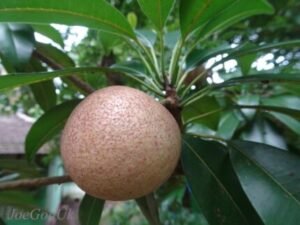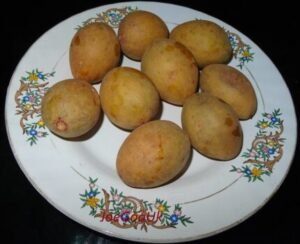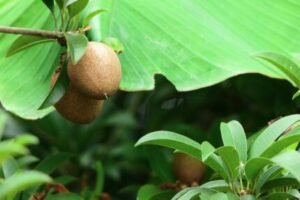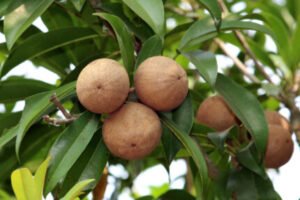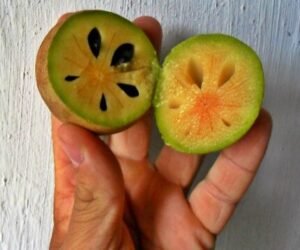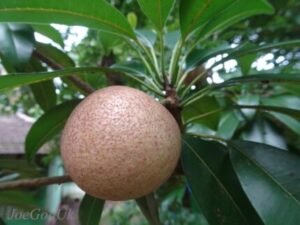Medically reviewed by Dr. Ramesh Gaddam, M.D. — Written by Sumalatha, D.N.H.E
Table of Contents
ToggleChikoo, also known as Sapodilla / Sapota, is a delicious tropical fruit packed with nutrients. This sweet and creamy fruit offers a range of health benefits, from boosting your immune system to improving digestion.
Rich in vitamins, minerals, and antioxidants, Chikoo supports overall health and wellness.
It can aid in heart health, enhance skin appearance, and provide natural stress relief. Including Chikoo in your diet can be a tasty way to enjoy these health benefits.
1. Nutrition
Nutritional Profile of Chikoo (Per 100 grams):
| Nutrient | Amount |
|---|---|
| Calories | 83 kcal |
| Carbohydrates | 19.5 g |
| Dietary Fiber | 5.3 g |
| Sugars | 14.7 g |
| Protein | 0.5 g |
| Fat | 1.1 g |
| Vitamin A | 60 IU |
| Vitamin C | 14.7 mg |
| Vitamin E | 0.6 mg |
| Potassium | 193 mg |
| Copper | 0.2 mg |
| Iron | 0.7 mg |
| Calcium | 18 mg |
| Phosphorus | 34 mg |
Chikoo is not just tasty but also packed with essential nutrients that benefit your health.
Here’s a closer look at its nutritional content:
Vitamins:
Chikoo is a great source of Vitamin A, which helps maintain healthy skin and vision.
It also contains Vitamin C, which boosts your immune system, and Vitamin E, known for its antioxidant properties.
Minerals:
This fruit is rich in Potassium, which supports heart health by helping to regulate blood pressure.
It also provides Copper, which aids in iron absorption, and Iron, essential for red blood cell production.
Dietary Fiber:
Chikoo is high in fiber, which promotes digestive health by preventing constipation and supporting a healthy gut.
Natural Sugars:
While Chikoo has natural sugars that give it a sweet taste, these sugars provide a quick source of energy without the added calories of processed sweets.
Phytochemicals/Antioxidants:
The fruit contains antioxidants that protect your cells from damage caused by harmful free radicals.
Calories:
Although Chikoo is nutrient-dense, it has a moderate calorie content, making it a balanced choice for a healthy diet.
2. Health Benefits of Chikoo
Chikoo offers a variety of health benefits, making it a great addition to your diet:
Boosts Immunity
Rich in Vitamin C, Chikoo helps strengthen your immune system, making it easier for your body to fight off infections and illnesses.
Digestive Health
The high fiber content in Chikoo aids in digestion, helping to relieve constipation and promote a healthy gut.
Heart Health
Chikoo is a good source of Potassium, which helps regulate blood pressure and supports overall heart health.
Antioxidant Properties
Packed with antioxidants, Chikoo protects your cells from damage caused by free radicals, which can help reduce the risk of chronic diseases.
Skin Health
Vitamins A and E in Chikoo contribute to healthy skin, promoting a radiant complexion and helping to reduce signs of aging.
Bone Health
The presence of calcium and phosphorus in Chikoo supports strong and healthy bones.
Anti-inflammatory Effects
Chikoo’s natural compounds can help reduce inflammation in the body, potentially easing conditions like arthritis.
Natural Stress Relief
Chikoo has calming properties that can help reduce stress and promote relaxation, making it a soothing treat for a busy day.
3. Culinary Uses
Chikoo is versatile and can be enjoyed in various ways. Here’s how you can incorporate this tasty fruit into your meals:
Fresh Consumption:
Simply peel and eat Chikoo fresh for a sweet and nutritious snack. Its creamy texture makes it a delicious treat on its own.
Smoothies and Milkshakes:
Blend Chikoo into smoothies or milkshakes for a rich, creamy flavor. It pairs well with other fruits like bananas and berries.
Desserts and Salads:
Use Chikoo in desserts like fruit salads, puddings, or ice creams. Its natural sweetness enhances the taste of various dishes, adding a tropical twist.
By adding Chikoo to your recipes, you not only enjoy its delicious flavor but also benefit from its rich nutritional profile.
4. Potential Side Effects
While Chikoo offers numerous health benefits, it’s important to be aware of potential side effects:
High-Calorie Content:
Chikoo is relatively high in calories compared to some other fruits.
Eating it in moderation is important, especially if you’re managing your weight.
Moderation for Weight Management:
Due to its natural sugars and calorie content, consuming Chikoo in large amounts could contribute to weight gain.
Balancing it with other fruits and maintaining portion control is key.
Possible Digestive Discomfort:
For some people, the high fiber content in Chikoo might cause digestive issues like bloating or gas if consumed in excess.
Start with a small amount to see how your digestive system reacts.
Allergic Reactions:
Although rare, some individuals may have allergies to Chikoo.
If you experience symptoms like itching, swelling, or difficulty breathing after eating it, seek medical advice.
Enjoy Chikoo as part of a balanced diet to reap its benefits while minimizing any potential side effects.
5. Chikoo benefits for skin
Chikoo is great for your skin due to its high levels of Vitamins A and E. Vitamin A helps maintain healthy skin and can improve its appearance.
Vitamin E acts as an antioxidant, protecting your skin from damage caused by free radicals.
Together, these vitamins can help keep your skin looking fresh and vibrant.
Regular consumption of Chikoo can also help reduce signs of aging, giving you a more youthful glow.
It’s generally safe to eat 1 to 2 Chikoo fruits per day as part of a balanced diet.
Chikoo is nutrient-rich but also contains natural sugars and calories, so moderation is key.
Consuming it in reasonable amounts helps you enjoy its health benefits without overloading on calories or sugar.
7. Chikoo fruit benefits for Male
Chikoo fruit provides a range of benefits for men. Its natural sugars offer a quick energy boost, helping to keep you active throughout the day.
The potassium in Chikoo supports heart health by aiding in the regulation of blood pressure.
Additionally, the high fiber content promotes healthy digestion and helps prevent constipation.
Chikoo is also beneficial for skin health, with Vitamins A and E working to reduce signs of aging and maintain a youthful appearance.
Lastly, the Vitamin C in Chikoo strengthens the immune system, providing protection against common illnesses and infections.
Including Chikoo in your diet can enhance overall well-being and support various aspects of health.
8. Chikoo fruit benefits for Female
Chikoo fruit provides a range of benefits for women. Its Vitamins A and E support skin health by maintaining a glowing complexion and reducing the appearance of fine lines and wrinkles.
The natural sugars in Chikoo offer a quick energy boost, which can be especially useful during busy days.
High in fiber, Chikoo promotes healthy digestion and helps prevent constipation.
Additionally, the Vitamin C in Chikoo strengthens the immune system, protecting against infections and illnesses.
The calcium and phosphorus in Chikoo also support bone health, which is particularly important for women as they age.
Including Chikoo in your diet can enhance overall well-being and contribute to various aspects of health.
9. Chikoo fruit benefits for Male Sperm
Chikoo fruit can be beneficial for male reproductive health in several ways.
Its high content of vitamins, particularly Vitamin C, helps protect sperm from damage caused by oxidative stress, improving sperm quality.
Additionally, the fruit’s rich supply of antioxidants, including Vitamin E, further supports sperm health by combating free radicals that can negatively affect sperm production and function.
Chikoo also provides essential minerals like zinc and magnesium, which are important for hormone regulation and sperm production.
Including Chikoo in your diet can contribute to improved reproductive health and support overall fertility.
10. Benefits of Chikoo Shake for weight gain
Chikoo shakes are an excellent choice for those looking to gain weight due to their high-calorie content and natural sweetness.
The shake provides a significant amount of energy, which can help you consume more calories essential for weight gain.
With its rich supply of essential vitamins and minerals, including Vitamins A, C, and E, as well as potassium and calcium, Chikoo shakes support overall health while promoting weight gain.
Adding ingredients like milk or yogurt increases the protein content, which is important for muscle growth.
Additionally, incorporating nuts or seeds can add healthy fats, further boosting the calorie content.
Overall, Chikoo shakes offer a tasty and nutritious way to help increase your daily calorie intake and support your weight gain goals.
Conclusion
Chikoo, or Sapota, is a nutrient-rich fruit that offers a wide range of health benefits.
Its rich supply of vitamins, minerals, and antioxidants makes it a great addition to a balanced diet.
From boosting your immune system and supporting heart health to improving digestion and providing natural stress relief, Chikoo can enhance your overall wellness.
By incorporating Chikoo into your meals in various ways, you can enjoy its delicious flavor and health benefits while contributing to a healthier lifestyle.
Frequently Asked Questions (FAQs)
What happens if we eat chikoo daily?
Eating Chikoo daily can offer a range of health benefits, including improved digestion, enhanced skin health, and increased energy.
However, due to its natural sugar and calorie content, consuming it in moderation is important to avoid excessive calorie intake.
Is chikoo high in sugar?
Yes, Chikoo is relatively high in natural sugars, which contribute to its sweet taste.
While these sugars provide energy, it’s best to consume Chikoo in moderation, especially if you are watching your sugar intake.
What is the best time to eat chikoo?
The best time to eat Chikoo is as a mid-morning or afternoon snack. It can also be enjoyed as part of a meal or in a smoothie.
Eating it at these times can help provide energy and satisfy hunger.
What is the disadvantage of chikoo?
One disadvantage of Chikoo is its high natural sugar content, which can contribute to weight gain or affect blood sugar levels if consumed excessively.
It’s also relatively high in calories, so moderation is key.
Does chikoo increase hemoglobin?
Chikoo contains iron and Vitamin C, which can help improve hemoglobin levels.
However, it is not a primary source for significant increases in hemoglobin and should be part of a balanced diet.
Is chikoo heat or cold for the body?
Chikoo is generally considered a warming fruit for the body. It is best consumed in moderation, especially if you are prone to conditions aggravated by heat.
Which is better, chikoo or banana?
Both Chikoo and bananas offer unique health benefits. Chikoo is rich in Vitamin C and antioxidants, while bananas provide potassium and Vitamin B6.
The choice depends on your specific nutritional needs and taste preference.
What is the English name for Chiko fruit?
The English name for Chiko fruit is “Sapota.”
Is chikoo good for uric acid?
Chikoo has a low purine content, making it a good option for those managing uric acid levels.
However, it should be consumed in moderation as part of a balanced diet.
Is chikoo good for kidney?
Chikoo can be beneficial for kidney health due to its low purine content and high potassium levels. It is generally safe for kidneys, but moderation is important.
Can we eat chikoo in high BP?
Yes, Chikoo can be included in a diet for high blood pressure due to its potassium content, which helps regulate blood pressure.
However, moderation is important, especially if you are monitoring your calorie intake.
Is chikoo good for arthritis?
Chikoo’s anti-inflammatory properties can help reduce inflammation associated with arthritis.
Its high vitamin and mineral content can also support overall joint health.
Which fruit is best for knee pain?
Fruits rich in antioxidants and anti-inflammatory properties, like berries, oranges, and pineapples, are beneficial for knee pain.
Chikoo can also be included for its general anti-inflammatory benefits.
Is chikoo good for bones?
Yes, Chikoo is good for bone health due to its calcium and phosphorus content, which supports bone strength and density.
Is chikoo bad for constipation?
No, Chikoo is not bad for constipation. In fact, its high fiber content can help promote regular bowel movements and relieve constipation.
When should you avoid chikoo?
You should avoid Chikoo if you are trying to manage your calorie or sugar intake, as it is relatively high in natural sugars and calories. It should also be consumed in moderation if you have digestive issues related to high fiber.
Can chikoo cause gas?
Chikoo can cause gas in some individuals due to its high fiber content. If you experience bloating or gas, consider consuming it in smaller amounts.
Is chikoo good for acidity?
Chikoo is generally gentle on the stomach and can help soothe acidity due to its natural sweetness and low acidity. However, if you have severe acidity issues, consult with a healthcare provider.
Can I eat chikoo at night?
Yes, you can eat Chikoo at night. It can be a good option for a healthy evening snack, providing a sweet and nutritious treat without being overly heavy.
Is chikoo hot or cold?
Chikoo is considered a warming fruit, so it may be best consumed in moderation if you have conditions that are aggravated by heat.
What is chiku called in English?
Chiku is called “Sapota” in English.
What is chiku called in America?
In America, Chiku is commonly referred to as “Sapodilla.”
Is chikoo good with milk?
Yes, Chikoo is good with milk and can be blended into a delicious and nutritious shake. The combination adds both flavor and additional nutrients.
Can diabetic patients eat chikoo?
Diabetic patients can eat Chikoo in moderation. Its natural sugar content should be considered, and it is best consumed as part of a balanced diet.
What is a super fruit for diabetes?
Fruits with low glycemic indices, like berries and apples, are considered super fruits for diabetes. They have less impact on blood sugar levels and offer valuable nutrients.
How much sugar is in Chikoo?
Chikoo contains approximately 14.7 grams of natural sugars per 100 grams. This high sugar content contributes to its sweet taste and energy-boosting properties.
References
[1] https://timesofindia.indiatimes.com/life-style/food-news/sapota-season-exploring-chikoos-tasty-delights-and-health-benefits/articleshow/106614811.cms
[2] https://www.healthshots.com/fitness/staying-fit/7-health-benefits-of-chikoo-and-why-you-must-eat-it/
[3] https://www.truemeds.in/blog/chiku-fruit-health-benefits
[4] https://www.thequint.com/fit/7-health-benefits-of-chikoo
[5] https://www.slurrp.com/article/7-health-benefits-of-eating-spring-onion-1708691866965
[6] https://www.ncbi.nlm.nih.gov/pmc/articles/PMC10742967/
[7] https://toneop.com/blog/11-Amazing-Benefits-Of-Spring-Onions
[8] https://www.netmeds.com/health-library/post/spring-onion-scallion-health-benefits-nutrition-values-recipes-and-side-effects
Also Read:
11 Potential Health Benefits of Cantaloupe & [Side Effects]
10 Researched Health Benefits of Goji Berries (Wolfberries)
10 Nutritional Health Benefits of Khubani (Apricots)
Top 7 Health Benefits of Green Apple (You Need to Know)
Medically reviewed by Dr. Ramesh Gaddam, M.D.

General Physician, Diabetologist, and Critical Care Specialist.
Related
Discover more from Health Build-Up
Subscribe to get the latest posts sent to your email.

